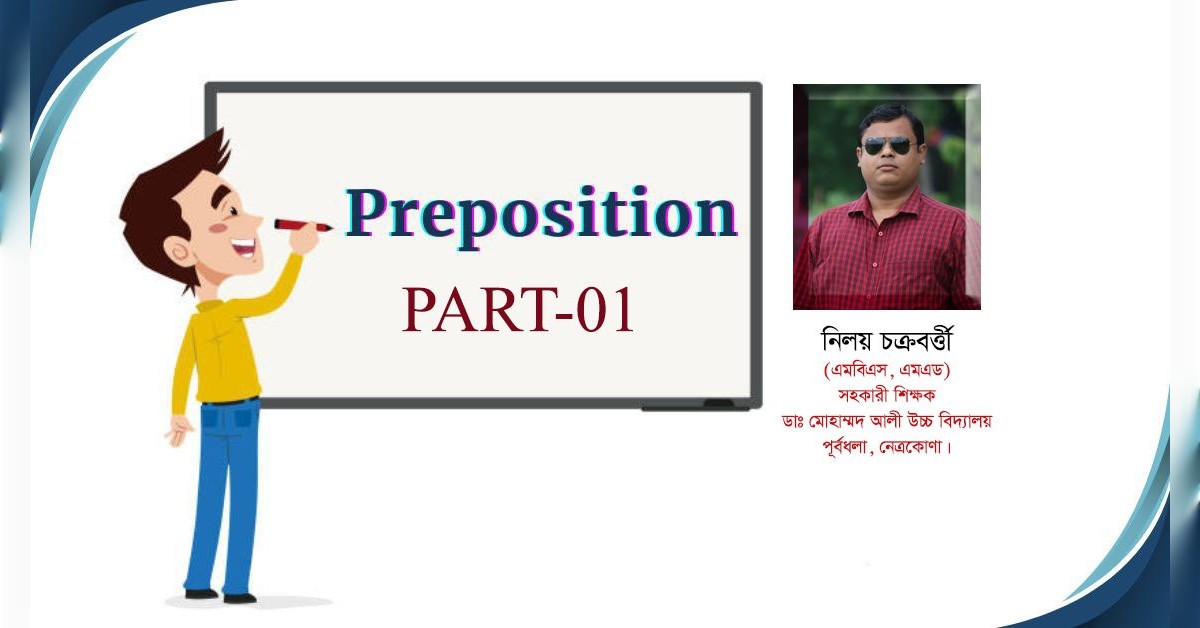যে সকল Parts of speech “ Noun/Pronoun” এর পূর্বে ব্যবহৃত হয়ে অন্যান্য parts of speech এর সাথে সর্ম্পক স্থাপন করে তাদেরকে preposition বলে।
Preposition of time (In, On, At)
সুনির্দিষ্ট সময় বোঝাতে “at” ব্যবহৃত হয়।
- I will go there at 5 o’clock.
- He may come at 6 p.m
কোন দিনের নির্দিষ্ট সময়ের পূর্বে “at” হয়। কিন্তু সম্পূর্ণ দিন বোঝালে “on” ব্যবহৃত হয়।
- The child becomes afraid at night.
- I will meet you at Christmas.
- I will do the work on Friday.
- On the following day, on 16th instant, on May first.
- At that time, at breakfast time, at brunch time, at noon, at midnight
রাতের নির্দিষ্ট সময় বোঝাতে “ In the” ব্যবহৃত হয়।কিন্তু সম্পূর্ণ রাত বোঝাতে at ব্যবহৃত হয়।
- I woke up several times in the night.
- I usually have my window opened at night.
সকাল (morning), বিকাল (afternoon), সন্ধ্যা (evening) এদের আগে “in the” ব্যবহৃত হয়।কিন্তু দিনের সকাল,বিকাল এবং সন্ধ্যা বোঝাতে “On” ব্যবহৃত হয়।
- The man has come to meet me in the afternoon.
- The man has come to meet me on the afternoon of Victory day.
- Cocks crow in the morning.
Cocks crow on Sunday morning.
Note:- early morning, late night এবং late evening এর ক্ষেত্রে “in the” ব্যবহৃত হয়।
- I heard the news in the late afternoon.
- The government managed the political violence in the early morning.
মনে রাখুন:- This morning, this week, last August, last week, last summer, next Monday, next week, next year, everyday, every week, at/in/on
- Are you going out this evening. ( Not in this evening )
- The garden was lovely last summer. ( Not in last summer)
- I am going to holiday next Monday. ( Not on next Monday )
মাস, সাল এবং সিজন পূর্বে “in” ব্যবহৃত হয়। যেমন:-
- The president will meet the press in January.
- Thousands of people died in a road mishap in 1997.
- We had to make the negotiation in summer.
নির্দিষ্ট সময়ের শুরু থেকে শেষের মধ্যে বোঝাতে In ব্যবহৃত হয়।
- He finished the job in three months.
- We will meet in three months’ time.
- I have to make the steps in six months.l
কোন নির্দিষ্ট সময়ের শুরু থেকে শেষের মধ্যে বোঝাতে “in” ব্যবহৃত হয়।
- Hurry! The train leaves in five minutes. ( It leaves five minutes from now )
- Goodbye! I will see you in a few days. ( A few days from now)
- He will finish the work in three months. ( In the space of three months from when it starts)
- The man will meet me in five months time. ( In the space of five months from when it starts )
Particular period of time বোঝাতে “in” ব্যবহৃত হয়।
- It’s the first letter I have had in ten years.
- I haven’t seen him in years.
- She is the first lady we met in twenty years.
Holiday period বোঝাতে British English G at হয়। কিন্তু American English এ on ব্যবহৃত হয়।
- I will see you at the weekend. ( British English )
I will see you on the weekend. ( American English )
- My sister will meet me at Christmas. ( British English)
My sister will meet me on Christmas. ( American English )
দিনের/রাতের বেলা (During the day/nigh ) বোঝাতে by day/by night হয়।
- We prepared travelling by night. ( During the night )
- We stayed here by day. ( During the day )
Hourly ( এক ঘন্টা পরপর 1 o’clock. 2 o’clock, 3 o’clock ইত্যাদি ) বোঝাতে “on” ব্যবহৃত হয়।
- Train leaves the station on the hour.
- On the hour, the teacher comes to the class.
বয়স বোঝাতে At ব্যবহৃত হয়।
- She got married at eighteen.
- The old man died at seventy.
- My mother has taken the steps at the age of fifty.
Preposition of place (In, On, At)
লাইব্রেরি, অফিস, সিনেমা, থিয়েটার, হাসপাতাল, শিক্ষা প্রতিষ্টান ইত্যাদিতে স্বাভাবিক অবস্থান ( on duty/on respective work/institutional/functional aspect ) বোঝাতে at বসে।
- The man is at the office. ( On duty তাই at )
- The teacher is at the university to conduct classes. ( On duty তাই at )
- Jonathans are at the theatre. ( Watching a play/on duty )
- We were at the library. ( Choosing a book/on duty )
- Ann has been at the university. ( As a student/on duty )
কিন্তু লাইব্রেরি ,অফিস, সিনেমা, থিয়েটার, শিক্ষা প্রতিষ্টান ইত্যাদিতে কোন ভবন//Building এ অবস্থান করা বোঝাতে/ভিন্ন উদ্দেশ্যে থাকা বোঝাতে “in” হয়।
- The man is in the office. ( Inside the office not on duty )
- Jonathans are in the theatre to meet me. ( Inside the theatre not for watching a play )
- It was cold in the library. ( Inside the library )
- Nitu has been in the university to meet VC. ( as a visitor not student )
তার মানে হল;-
The man is at the office to do necessary work. (দায়িত্বরত)
My friend is in my office to gossip with me. (দায়িত্বরত)
এবার নিচের প্রশ্নগুলোর উরর দিন:
- The doctor is ——- hospital to consult his patients.
- The doctor is ——– the hospital to make the negotiation.
- My father was ——– my office to know my physical condition.
- My father was ——- his office to do his necessary work.
- The student is ——– college to meet his teacher.
Sizeable territories যেমন দেশ, মহাদেশ, রাজা, শহর, জেলা ইত্যাদির পূর্বে “in” হয়।
- The president is in Asia to make a negotiation.
- We live in Bangladesh in Dhaka.
কিন্তু Global distance বোঝাতে শহরের পূর্বে ব্যবহৃত হয়।
- Our plane refueled at London on its way from New York to Moscow. ( Global distance )
- Prime minister landed at Tokoyo while she was going to Brazil. ( Global distance )
Sea, river, lake, swimming pool ইত্যাদির পূর্বে in/at উভয়ই ব্যবহৃত হতে পারে। in ব্যবহৃত হলে পানির মধ্যে থাকা বোঝায় অন্যদিকে at ব্যবহৃত হলে পানির কাছাকাছি বোঝায়।
- The children are swimming in the river. ( in the water )
- The children are at the river. ( near/beside the river )
- The man was in the sea. ( in the water)
- The man was at the sea. ( near/beside the sea )
Note :- তবে at sea (the না থাকলে ) মানে হল জাহাজের উপর (on ship)
- He is swimming in the sea. ( in the water )
- He is at the sea. ( near/beside the sea )
- He is at ( on ship )
কিন্তু Village/town এর ক্ষেত্রে at/in ব্যবহার করা যায়।
- Shakespeare was born in/at Stratford-upon-Avon.
- Mark was in/at sylhet to conduct a training.
Touching, respecting, barring, regarding, concerning, pending, considering, during এবং notwithstanding ইত্যাদি present participle সমূহ Noun/pronoun এর পূর্বে বসে কখনো কখনো preposition এর কাজ করে।
- Barring (apart from/expecting) accident, the mail will arrive tomorrow.
- Concerning (about) his experience, the authority recruited him.
- Notwithstanding ( in spite of ) has riches, he was not able to buy a new car.
- Considering ( taking into account ) the quality, the price is not high.
- Touching ( with regard to ) this matter, I have not yet made up my mind.
Correct use of some prepositions
- Absorbed এর পর in হয় at নয়।
- Nitu is absorbed at her hopes. ( Incorrect )
Nitu is absorbed in her hopes. ( Correct )
- He was absorbed at his study. ( Incorrect )
He was absorbed in his study.( Correct )
- Absent এর পর from হয়। at নয়।
- Nitu is absented at the meeting. ( Incorrect )
Nitu is absented from the meeting. ( Correct )
- Some students absented themselves at going to school. ( Incorrect )
Some students absented themselves from going to school. ( Correct )
- Await এর পর for হয় না। কারণ await মানেই wait for.
- They are awaiting for my response. ( Incorrect )
They are awaiting my response. ( Correct )
- My mother is awaiting for my result. ( Incorrect )
My mother is awaiting my result. ( Correct )
- Afraid এরপর of হয়। from নয়।
- He is afraid from the sin. ( Incorrect )
He is afraid of the sin. ( Correct )
- I am afraid from the dark. ( incorrect )
I am afraid of the dark. ( Correct )
- Angry with somebody (ব্যক্তি), কিন্তু angry at something (বন্তু)
- They were angry at Nitu. ( Incorrect )
They were angry with Nitu . ( Correct )
- I was angry with pollution. ( Incorrect )
I was angry at pollution. ( Correct)
- Accustomed/Unaccustomed এরপর সর্বদাই to হয় with নয়।
- The man is accustomed with doing the job. ( Incorrect )
The man is accustomed to doing the job. ( Correct )
- Trump is unaccustomed with thesis writing. ( Incorrect )
Trump is unaccustomed to thesis writing. ( Correct )
- Accuse এর পর of হয়। for নয়।
- He is accused for murder. ( Incorrect )
He is accused of murder. ( Correct )
- The criminal was accused for stealing our property. ( Incorrect )
The criminal was accused of stealing our property. ( Correct ) পরের পার্ট আসছে…..



















Be First to Comment